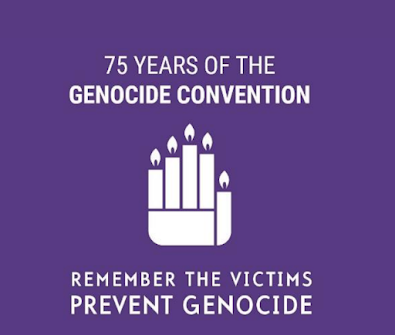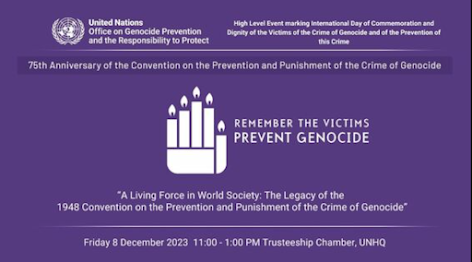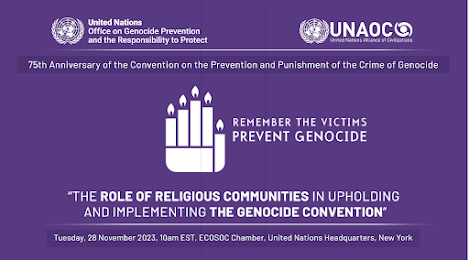EVENT: On Friday, December 8th, from 11:00 to 10:00 PM (EST) at the United Nations Trusteeship Chamber UNHQ, We will mark the International Day of Commemoration and Dignity of the Victims of the Crime of Genocide and of the Prevention of this Crime 2023, as well as the 75rd anniversary of the 1948 Convention on the Prevention and Punishment of the Crime of Genocide (the “Genocide Convention”), the first human rights treaty adopted by the General Assembly. The event will build upon a series of expert consultations and meetings convened by the Office of the Special Adviser on the Prevention of Genocide in the lead up to the December 9th event, as well as an info-campaign from the United Nations archives, which seek to explore in detail the impact of the Convention in the fields of accountability, protection and prevention. The Global event will feature opening remarks by United Nations Secretary-General, the President of the 77th session of the General Assembly and the Special Adviser on the Prevention of Genocide, followed by an interactive dialogue; Remarks will also be made by member states, representing regional groups.
Every year, the United Nations Special Adviser on the Prevention of
Genocide organizes events to mark this International Day, honoring the
victims of genocide and the anniversary of the adoption of the Convention.
The 1948 Genocide Convention codified for the first time the crime of
genocide in international law. Its preamble recognizes that “at all periods
of history genocide has inflicted great losses on humanity” and that
international cooperation is required to “liberate humankind from such an
odious scourge”. To date, 153 States have ratified the Convention.
Achieving universal ratification of the Convention remains an important
step in advancing genocide prevention. The Genocide Convention includes
the obligation not only to punish the crime of genocide but, crucially, to
prevent it.
In the 75 years since its adoption, the Genocide Convention has played an
important role in the development of international criminal law, in holding
perpetrators of this crime accountability and in giving a voice to its many
victims.
The principles set out in the Convention have been utilized by international
criminal tribunals to prosecute perpetrators, and the crime of genocide, as
set out in the Convention, today forms part of the core crimes for which
the International Criminal Court has jurisdiction. The Convention has also
supported national jurisdictions to ensure accountability for this crime. At
the same time, the prevention obligation of the Convention has provided a
framework for promoting early warning and it has spurred national,
regional and international mechanisms for prevention.
This year’s event to mark the 75th anniversary of the Genocide Convention
will seek to highlight some of the achievements that emanate from the
Convention, showcasing its lasting legacy.
The event will also reflect on the challenges that remain. Genocide is still
a threat in the world today. Around the world, populations remain at risk of
this crime. The need to invest in prevention as envisaged by the Convention
drafters 75 years ago remains as relevant as ever. The event, therefore, will
also seek to showcase the work of champions of prevention and their
tireless efforts to protect populations from the scourge of genocide. The event will build on a series of expert meetings to be convened by the UnitedNations Special Adviser on the Prevention of Genocide in the lead up to the December 9th event, which will seek to explore in detail the impact of the
Convention in the areas of accountability, protection and prevention.
OBJECTIVE
The event will commemorate the 75th anniversary of the Genocide Convention by:
I) Showcasing its legacy and impact at the international, regional
and national levels.
II) Demonstrating its continued relevance as a tool for prevention
and punishment of the crime of genocide and showcasing
positive examples of champions of prevention working in the
fields of prevention, protection and accountability for genocide.
III. PARTICIPANTS
The event will be open to Member States, UN staff, civil society, media and
the public. Permanent Representatives of Member States in regional
groups will be invited to speak.
Remarks of the UNAOC High Representative on “The Role of Religious Communities in Upholding and Implementing the Genocide Convention”.
Your Excellency, Ms. Alice Wairimu Nderitu, Under-Secretary-General, Special Adviser of the United Nations Secretary-General on the Prevention of Genocide;
Ms. Sadhvi Bhagawati Saraswati, Secretary-General of the Global Interfaith WASH Alliance;
Rabbi Burton L. Visotzky, Appleman Professor of Midrash and Interreligious Studies Emeritus at the Jewish Theological Seminary of America;
Dr. Mohamed Elsanousi, Executive Director of the Network for Religious and Traditional Peacemakers;
Ms. Debra Boudreaux, Chief Executive Officer of the Buddhist Tzu Chi Foundation;
Mr. Rudelmar Bueno de Faria, General Secretary at ACT Alliance;
Excellencies and distinguished guests,
The 75th anniversary of the Convention on the Prevention and Punishment of the Crimes of Genocide is an apt time to commemorate the victims of the crime of genocide, to recall the robust commitment to multilateralism that was required for the global community to codify the crime of genocide into international law, and to take stock of efforts to prevent it.
Over the past two months, the plea for Humanity has been revibrating in speeches and comments made by political leaders, faith actors and ordinary people.
Humanity is the exact opposite of atrocities perpetrated by state or non-state actors.
Genocide is a testament that the perpetrators are stripped of their of their humanity. They have no moral compass.
It is an unfortunate truism that the Genocide Convention remains highly relevant seven-and-a-half decades after it was unanimously adopted by the UN General Assembly.
Indeed, the 75th Anniversary of the Convention on the Prevention and Punishment of the Crime of Genocide is approaching at an especially somber and tumultuous juncture in human history.
An alarming wave of antisemitic, anti-Muslim hatred and anti-Arab bigotry and hate has been unleashed around the world since the eruption of the situation in the Middle East.
These incidents included hate speech, harassment, intimidation, damage to personal property, the desecration of places of worship, death threats, and, most tragically, the murder of innocent people on the sheer account of their origin or faith.
All these manifestations are utterly rejected and cannot and should not be justified.
During this most recent spike in religious intolerance, some have falsely and maliciously invoked religion to aggravate misconceptions, fuel divisions, and sow fear and hatred.
This unacceptable upsurge in hate is an affront to the premises and spirit that led to the Genocide Convention and the principles and values on which the United Nations and organizations such as UNAOC are founded.
Distinguished delegates,
Seventy-five years ago, the nations of the world united in an unprecedented, at the time, demonstration of resolute and inspired multilateral action to support the first human rights treaty to be adopted by the United Nations — the Genocide Convention.
The Genocide Convention signified the international community’s resolve that the atrocities committed during the Second World War would never happen again.
This was without a doubt a remarkable and noble achievement and one worthy of commemoration. But we must not take for granted that the Genocide Convention and its principles will be promoted, protected, and implemented in the absence of the unwavering and active commitment of all of us.
In fact, we must remain as steadfast as ever in our efforts to ensure —individually and collectively as one humanity — that the Genocide Convention is upheld. That is because, sadly, both collective and individual vigilance is still required to, as stated in the preamble to the international treaty, “liberate humankind from such an odious scourge”.
Following the unimaginable horror that unfolded in Germany in the 1930s and 1940s, the world has let antisemitic, anti-Muslim, anti-Arab and Islamophobic discrimination and other forms of hatred based on religion, race, ethnicity or nationality go unaddressed on too many occasions.
The tragic consequences of failing to confront this hatred in a meaningful and holistic way were on full display in Cambodia, Rwanda and Srebrenica in the former Yugoslavia.
Sadly, in the 75 years since the landmark Genocide Convention became general customary international law, we have seen just how catastrophic and disastrous it can be to allow dehumanizing language and other acts of dehumanization go unfettered.
We know dehumanizing acts can beget even worse acts, including genocide and other atrocity crimes.
At the same, we must exercise our diligence about how we use the term genocide because the term has frequently been misused of late in popular discourse. The legal definition of genocide is precise and the determination about whether or not genocide has occurred can only be made by competent international and/or national courts of law with the jurisdiction to try such cases following a rigorous investigation that meets appropriate international standards for due process.
That being said, it is incumbent on all of us to do everything in our power to prevent an escalation in the scale and intensity of violence against those targeted by hate, which means pushing back against every single attempt to target people because of their nationality, ethnicity, religion or race, or any other form of identity.
Not only must we counter intolerance, discrimination and hate to avert tragedy, we must at the same time do everything at our disposal to promote tolerance, dialogue and mutual understanding, which enable peaceful coexistence and harmony among all people.
Distinguished guests,
Promoting interfaith dialogue and partnerships, as well as countering hate crimes, are keys to UNAOC’s work to foster mutual respect and strengthen intercultural and interreligious understanding.
UNAOC is proud of providing a recognized global platform for interreligious and intercultural dialogue with the aim of bridging the cultural divides and building cohesive, inclusive and peaceful societies.
We have long recognized the crucial role played by religious leaders in calling out prejudices and hate speech targeting individuals or communities based on their religion or belief, ethnicity.
They have a role in promoting mutual respect, empathy and human dignity for all.
Let me emphasize that protection should be given to both believers and non-believers.
In this context, We have collaborated on the introduction and management of tools that actively encourage tolerance based on mutual respect, and promote intercultural and interreligious dialogue.
The UN Plan of Action to Safeguard Religious Sites was developed by UNAOC and launched by the UN Secretary-General in 2019.
The Plan is rooted in the Universal Declaration of Human Rights, which was adopted by the UN one day after the Genocide Convention and sets out the fundamental human rights to be universally protected.
The Plan advocates the sanctity of religious sites and safety of worshippers. It stresses the right of all believers to access holy sites and to practice their religious rituals and traditions freely, peacefully, and safely without fear or intimidation.
Attacks on places of worship and the perpetuation of hate against the faithful at their places of worship strike at the very core of a community’s sense of identity and belonging.
Equally important, is the UN Strategy and Plan of Action on Hate Speech developed by The office of the Special Advisor for Genocide Prevention . The Strategy and the Plan of Action to Safeguard Religious Sites complement each other. And I am very pleased with the collaboration of our 2 offices and my personal engagement with the Special Advisor. .
I look forward to sharing the stage with religious leaders and faith actors who are here today, virtually and in person, to provide their own insights about how religious communities are upholding the legacy of the Genocide Convention.
In the meantime, I am reminded that the Torah encourages interreligious dialogue and cooperation by teaching us to accept others without prejudice or bias: “You shall not hate your kinsfolk in your heart. Reprove your kinsman, but incur no guilt because of him. You shall not take vengeance or bear a grudge against your countrymen. Love your fellow as yourself.” (Leviticus 19:17-18)
According to the Holy Qur’an, God created nations and tribes “so that we might know one another. “O mankind, indeed We have created you from male and female and made you peoples and tribes that you may know one another. Indeed, the most noble of you in the sight of Allah is the most righteous of you. Indeed, Allah is Knowing and Acquainted.” (Qur’an, 49:13)
Let us take inspiration from these and other examples from religious communities that remind us of our capacity to stand together as one human family — one humanity — rich in cultural and religious diversity, equal in dignity and rights, united in solidarity.
I thank you.



No comments:
Post a Comment